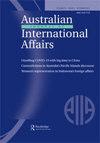与中国脱钩:美国的亚洲盟友如何应对华为禁令
IF 1.8
3区 社会学
Q2 INTERNATIONAL RELATIONS
引用次数: 6
摘要
随着美中战略竞争的加剧,华盛顿一直在寻求其亲密盟友和合作伙伴来对抗中国在全球技术领导地位上的影响力。本文将华为禁令作为中美竞争的代表,重点关注联盟光环的概念,并分析了美国在亚洲的三个主要盟友——澳大利亚、日本和韩国——如何回应华盛顿对中国科技公司与全球供应链脱钩的相互支持的期望。我们认为,鉴于华为禁令是关于与中国经济相关的未来风险,而不是已证明的军事威胁,因此在整个美国联盟网络中建立盟友可靠性更具挑战性。我们的对比分析显示,澳大利亚的反应最为直接,在美国之前就禁止了华为,这与韩国相对温和的反应形成了对比。日本禁止华为的决定与澳大利亚一样果断,但东京方面试图保持低调。这些盟友的不同回应并非来自特朗普政府的外交压力,而是来自他们自己对与华为相关的安全风险的评估。本文章由计算机程序翻译,如有差异,请以英文原文为准。
Decoupling from China: how U.S. Asian allies responded to the Huawei ban
ABSTRACT As the U.S.-China strategic rivalry has intensified, Washington has looked to its close allies and partners to counter Chinese clout in global technology leadership. With the Huawei ban as a proxy for the U.S.-China competition, the paper focuses on the concept of the alliance halo and analyzes how the three key U.S. allies in Asia—Australia, Japan, and South Korea—responded to Washington’s expectations of mutual support on the decoupling of Chinese technology companies from global supply chains. We argue that given that the Huawei ban is about future risks associated with China’s economy, as opposed to demonstrated military threats, it was more challenging to establish allied reliability within the U.S. alliance network as a whole. Our comparative analysis shows that Australia’s reactions have been the most direct, banning Huawei before the United States, showing a contrast with South Korea’s relatively muted responses. Japan’s decision to ban Huawei was as decisive as Australia’s but Tokyo sought to keep a low profile. Rather than the diplomatic pressure from the Trump administration, these allies’ varied responses resulted from their own assessments of security risks associated with Huawei.
求助全文
通过发布文献求助,成功后即可免费获取论文全文。
去求助
来源期刊

Australian Journal of International Affairs
INTERNATIONAL RELATIONS-
CiteScore
3.20
自引率
13.30%
发文量
44
期刊介绍:
AJIA is the journal of the Australian Institute of International Affairs. The Institute was established in 1933 as an independent and non-political body and its purpose is to stimulate interest in and understanding of international affairs among its members and the general public. The aim of the Australian Journal of International Affairs is to publish high quality scholarly research on international political, social, economic and legal issues, especially (but not exclusively) within the Asia-Pacific region. The journal publishes research articles, refereed review essays and commentary and provocation pieces. ''Articles'' are traditional scholarly articles. ‘Review essays’ use newly published books as the basis to thematically examine current events in International Relations. The journal also publishes commentaries and provocations which are high quality and engaging pieces of commentary, opinion and provocation in a variety of styles. The Australian Journal of International Affairs aims to analyse international issues for an Australian readership and to present Australian perspectives to readers in other countries. While seeking to stimulate interest in and understanding of international affairs, the journal does not seek to promote any particular policies or approaches. All suitable manuscripts submitted are sent to two referees in a full ''double blind'' refereeing process.
 求助内容:
求助内容: 应助结果提醒方式:
应助结果提醒方式:


